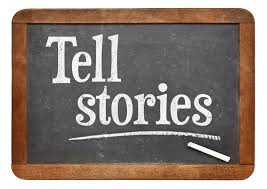The Role of Storytelling Within The Writing Classroom
Every writer has special sources for the ideas that spark their writing. In reality, ideas are waiting all around us. Those inspirational sparks are many and varied. They are hiding in plain sight, awaiting discovery. They saturate the world in which we operate daily. The writer must develop the skill of recognizing an idea’s potential and then shaping it to their particular vision.
The challenge in the classroom is how to assist those beginning to discover writing, how best to harness ideas and express them in a multitude of ways. The inexperienced writer needs support in becoming a keen observer, an enthusiastic collector and an active listener in order to better capture these writing ideas.
Stories begin to loom large in the lives of young writers. It is therefore important to nurture this growing sense of story while simultaneously creating opportunities for them to create their very own -real, imagined or blended.
Storytelling
Before the invention of the printing press, books were so rare they were memorized and recited. Storytelling existed as a rich tradition. Stories were shared through rich and detailed retellings. It provided a way to transmit culture. To this day the enduring stories of many cultures continue to be handed down.
It is most beneficial to encourage storytelling among young learners from the very beginning of the school year. Storytelling needs to assume a central role in the classroom. Such practice supports the development of ideas, it adds to the knowledge of narrative and fosters oral language capabilities. Conversations assume greater relevance and purpose. The conversations also assume a greater quality.
When storytelling is encouraged, it indicates to the learner, the value placed on the stories they bring into the classroom. In culturally diverse classrooms, storytelling provides an enriching variety of cross cultural experiences upon which writers can eventually call.
Linking storytelling to the writing workshop is so important. It can be a most valuable pre-writing activity. The writer gets to ‘rehearse’ their possible words. The details of the story are more likely to feature. They control the material substance of the story as well as an opportunity to express thoughts and ideas before committing them to the page. The writing that follows, frequently incorporates more detail than one might expect from a ‘cold write.’ Fluency and writing volume increase. The richness and complexity of stories are more likely to emerge. This strategy works in a variety of classroom contexts.
The storytelling can be to a partner, within a small group, or to the whole class. If your students are inexperienced story tellers there are a number of things you can do to support them.
· Tell some of your own stories
· Co construct some stories
· Invite parents and grandparents into the classroom to tell some of their stories
· Read memoir extracts (Shared Reading)
· Read aloud, rich and varied stories from various cultures and times.
· Share your own notebook stories
· Invite students to bring in family stories
· View stories
· Discuss what makes a good story
· Listen to Ballads/songs that tell stories
· Encourage young writers to tell their stories to their peers, families
· Incorporate storytelling options into pre-writing strategies
So, when the new school year
launches bring stories with you, share them and work mindfully to establish in
the minds of young writers that storytelling is encouraged.
Encourage young writers to tell their stories to different audiences
Writers frequently tell their stories many times before
committing them to paper. With practice the writer develops a keen nose for
stories that are memorable and worthy of attention and effort.
Try saying something like this to your inexperienced
writers:
Encourage young writers to tell their stories to different audiences
-What stories keep tumbling around in your head? Commit to telling the story to different people and then write it down in your notebook. Write it down before it can slip away.
‘I look for what
fascinates me, or fills me with wonder. I look for stories that anger or
disgust me, or make me laugh out loud.’
Ralph Fletcher
A Writer’s Notebook
Unlocking The Writer Within
'I think our minds are made for stories. So stories are important, both in terms of what students should be allowed to do. I think it's what we
bring... And I think if we get too far away from story, we just lose contact with
human reality. So, story is our home base.'
Thomas Newkirk








Comments
Post a Comment